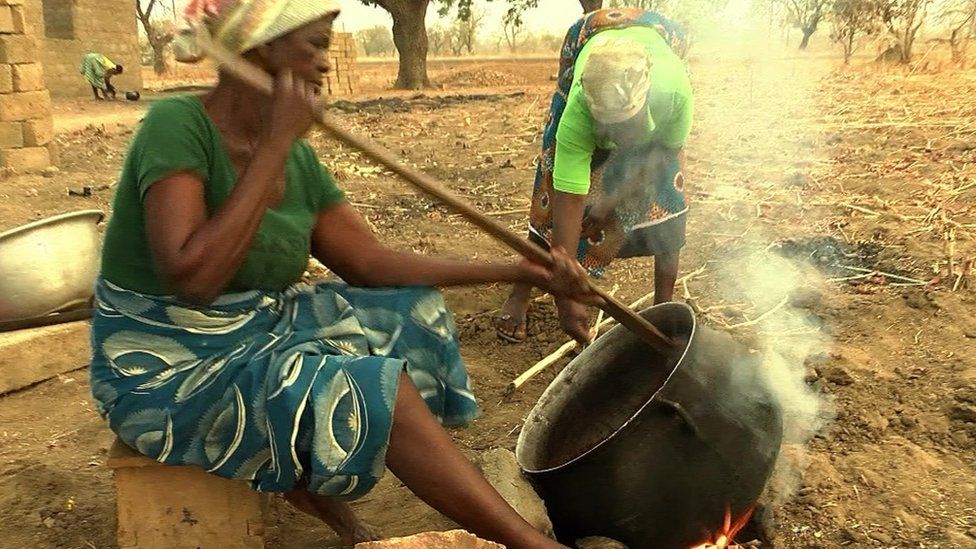Shea butter in Ghana: Hard labour for smooth skin
- Published

What is the price of having smooth skin? Some people spend a lot of money on beauty products which contain shea butter, but not much of that trickles down to the widows of a small farming community in northern Ghana who process nuts from which the moisturising paste is made.
After five days of picking, crushing, roasting, grinding and cooking, 65-year-old Rebecca Atornyege earns eight cedis ($2; £1.40) from selling her shea butter at the market.
Its production is the main commercial activity in Anateem as growing crops is hard in the dry season, the Harmattan, which can last up to eight months.
Mrs Atornyege has to support her family by making and selling shea butter, which has been the preserve of women for generations.
"Our mothers taught us how to process it," she says.
Rebecca Atornyege:
"This shea butter we're making will be sold to pay for her school fees and buy her books"
"When we were children, our mothers used to go to the bush, pick the nuts, come home to pound and grind it before frying it to make butter.
"We used to do the grinding and be singing along. That's how we learnt the process."
Mrs Atornyege has set up a widows' association of eight women who take it turns to help each other in Anateem to prepare butter for market day.
On the day I visit, four others join her and her teenage granddaughter as the ripe nuts from the shea tree are spread out to remove the black rotten ones before the rest are washed.
In recent years, there has been a rise in demand for shea butter as an ingredient not only in skin products, but confectionery and pharmaceuticals.
An estimated three million rural women in Ghana make a small income from shea butter, but Mrs Atornyege does not want her granddaughter to be one of them.
"This shea butter we're making will be sold to pay for her school fees and buy her books.
"My dream is for her to be successful… like a doctor or a nurse. I don't want her to suffer the way I am suffering.
"Her father was a drunkard and could not take care of her so I took her in to provide for her to go to school. If she becomes a doctor, I would be very proud of her and she would take care of me."
'Abuse, jealousy and witchcraft'
Her remark highlights the problems the women face in a community where the men seem to be conspicuously missing.
Those in sight doze under the shade of a tree in the distance as the women crush the nuts and sing to the rhythm of their wooden pestles striking a big granite grinding stone which they struggled to carry outside from the kitchen.
The women say the men never help and often drink with the profits and become abusive.
"It worries us. When we speak about it they tell us it's because we have no husbands," one of them says.
Iddi Zakaria works for the Tamale-based Shea Network Ghana, a non-profit organisation working to improve the sector, saying better regulation would help women get better prices.
"Beating of women, violating their rights and assault does happen," says Mr Zakaria.
More on shea butter:
"Women have infringements on their economic rights as well. Being a wife means every decision must be approved by the man. If you go contrary there's a price to pay."
He says jealously is also a problem.
"We have also seen cases of women being driven out by communities who accused them of witchcraft… we think the community became jealous of their success. The thinking is that women are not expected to get rich over their husbands.
"I witnessed in one village where we were meeting shea producers for a cooperative and the husband came and ordered his wife to quit and she had to."
Hidden snakes
Despite these setbacks, Mr Zakaria says there is a lot of activism by civil society organisations aimed at empowering the women.
Star Shea, a social business started four years ago, aims to help make production profitable for the women by working in co-operatives.
They train them to improve the traditional techniques, from the collection of nuts, processing steps for quality butter and packaging.
But Anna Perennic, Star Shea's chief executive, says it will never be a huge money spinner as the women are limited by their own capacity.
A woman may get 30kg (66 lbs) of nuts after walking miles to collect them in the wild in footwear that does not protect them from the many poisonous snakes hiding in the bush.
They will never get rich unless they are working for a small factory or co-operative set up by companies such as Body Shop so that they are able to work throughout the year, Ms Perennic says.
The shea nut season lasts from April until August - and sometimes the women buy surplus nuts from others.
Ms Perennic also says despite it being a multi-million dollar industry "nobody really wants to pay like three times the price" for a product that is used as a cocoa butter equivalent.
During my visit, Mrs Atornyege and her friends produced three small buckets of the product worth $23 - but only managed to sell $2-worth.
"The butter came out good. I was happy and hoping I will make some profit to buy food," says Mrs Atornyege.
Some of it will be used in the home as soap and pomade, but the rest they will try and sell again at the next weekly market day, along with their next batch.
"I am sad and don't know what to go home and do."
To listen to Akwasi Sarpong's radio documentary on the BBC World Service, click on this link Shea Gold.
- Published2 September 2010
- Published30 January 2015